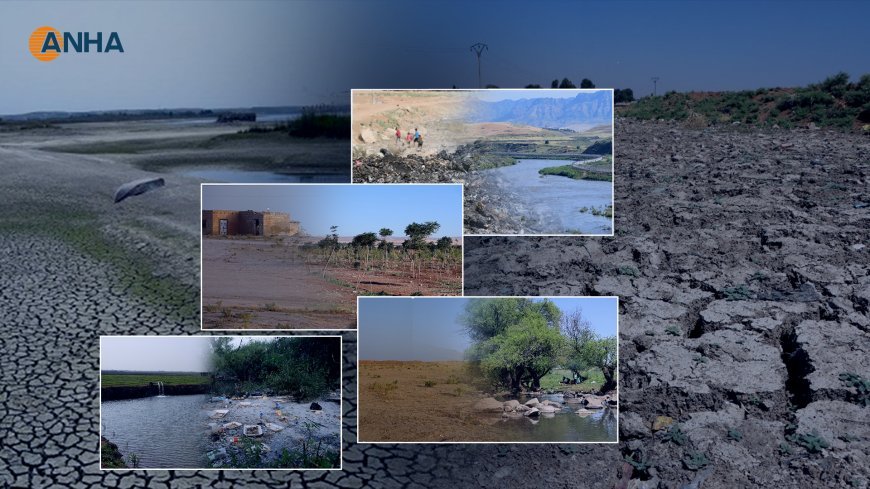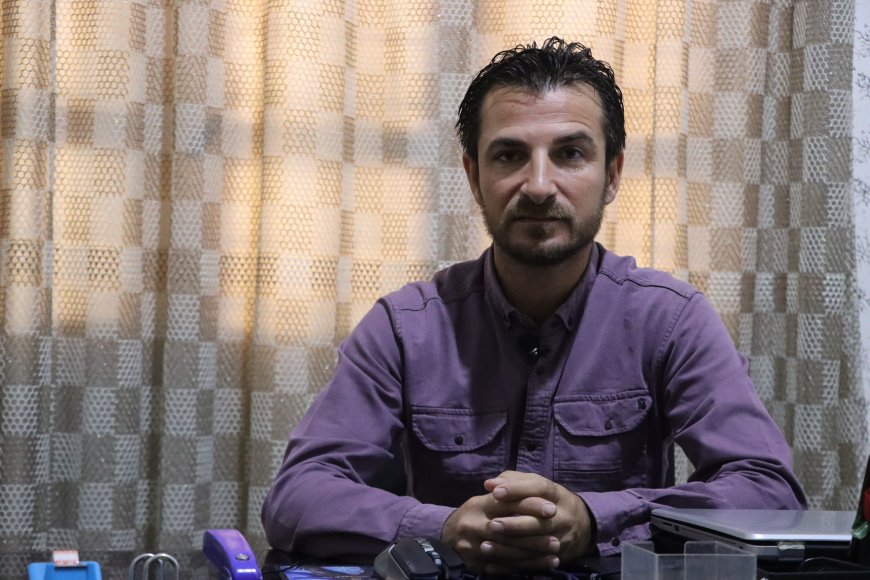Evidence, data indicate a dangerous decline in natural resources within Syria's food basket
Indicators reveal a deterioration in the natural resources of Jazira canton, including water, vegetation, air, and soil. An expert believes that the continuation of causative factors, such as unsustainable activities, the climate crisis, and Turkey's water policies, will have significant impacts and pose a threat to food security, biodiversity, and the future of the region.

Every year on July 28, the world celebrates International Day for the Conservation of Nature and its Resources. The aim of this day is to raise awareness of the importance of the planet's natural resources and the need to ensure their long-term protection.
Humans rely heavily on natural resources to meet their basic needs, such as food, water, and air. However, over-exploitation of these resources has escalated and reached unprecedented levels in this era.

According to the World Resources Outlook 2024 report issued by the United Nations Environment Programme last March, the global economy is consuming natural resources at an unsustainable rate. The report warns that resource use will triple over the next 50 years. This rampant over-exploitation hinders the natural regeneration of resources, disrupts the delicate balance of life, and contributes to the degradation of the environment.
The Reality of Natural Resources for Syria's Food Basket
Al-Jazira canton is considered a food basket for Syria due to its natural resources. However, according to relevant institutions, the region suffers from a significant shortage of natural resources and the destruction of its habitats.
Munther Suleiman, a specialist and member of the Environmental Monitoring Directorate at the Environment Authority of al-Jazira canton, believes that during the years of crisis, the region has witnessed a deterioration in the condition of natural resource elements and habitats, including water, soil, air, and vegetation cover. He attributes this deterioration to several factors, including climate change.
Regarding the factors and causes of the deterioration, Suleiman points out: Most of the rivers' sources originate in Turkey, which has deliberately cut them off and reduced their flow. This has led to a significant decrease in the water levels of rivers, lakes, and dams, which are essential sources for agriculture and drinking water. This decline has had a direct impact on the shrinkage of vegetation cover and the deterioration of the soil.
The climate crisis and rising temperatures, driven by industrial policies, have significantly impacted these resources, along with non-environmental human activities. These three factors contribute to the destruction of natural resources.
Regarding indicators of natural resource deterioration, he explains to ANHA's agency: Recent years have seen a significant decline in vegetation cover and trees due to logging, excessive groundwater and surface water extraction, and preceding years of low rainfall. Consequently, water resources have diminished, and the soil has undergone significant changes in its composition, losing many nutrients.
The air is also experiencing significant pollution due to the proliferation of diesel generators and the increase in vehicle traffic. All of these factors have led to the emergence of indicators of a crisis and deterioration in natural resources.
Water Sources in the canton
Dam water is a major source of water in the province. There are 10 dams of varying sizes, all of which draw their water from rivers controlled by the Turkish state. The maximum combined storage capacity of these dams is 1,160 million cubic meters, while the current storage is only 160 million cubic meters. In addition to these dams, there is one natural lake, Lake Khatuniya, with an estimated storage capacity of 15 million cubic meters.
Turkey has been accused of using water as a weapon against Syria. Since 2019, Turkey has deliberately cut off drinking water from over a million people in Hasakah through the Allouk station. This action followed Turkey's occupation of the Ras al-Ain area, creating a disaster zone according to data from the Democratic Autonomous Administration. In addition to this specific incident, Turkey has also blocked the Euphrates River and other rivers in the region.
Groundwater is another essential water source, particularly for agriculture, which is the most water-intensive sector. The province has 27,150 agricultural wells providing water for agricultural lands, along with 2,150 domestic and industrial wells.
Beyond the shortage of surface water from rivers and dams, groundwater levels in the region have been declining, reaching several meters in some areas over the past two years. This information comes from an environmental expert.
Decline in Vegetation Cover
The green area of trees, forests, and woodlands in North and East Syria amounts to 2 to 4% of the total area. In al-Jazira canton, this figure stands at 0.17%, with 4 million forest and fruit trees distributed across cities, rural areas, and nature reserves, according to the Forestry Directorate of the Agriculture and Irrigation Authority within the Democratic Autonomous Administration of North and East Syria.
These areas have experienced significant encroachment during the years of crisis and the control of ISIS mercenaries. While precise numbers are unavailable, an estimated half a million trees were felled from the Jabal Abdul Aziz Reserve alone.
The canton is part of the North and East Syria region, two-thirds of which is arid and faces salinization issues. An estimated 1 to 2 thousand hectares, or 85% of the land, is threatened by desertification annually.
The text you provided is not a complete sentence, but rather a collection of sentences and phrases. To improve the flow and clarity, here's a rewritten version with grammatical corrections and transitions:
This deterioration has significant effects on food security. The specialist highlights that the depletion of natural resources in the region creates instability and directly impacts the lives of the population, food security, and the existing biodiversity, including plants, soil, and pastures.
The Khabur River, one of the largest rivers in the canton, stretching for 320 kilometers, faces a complete cessation of water supply throughout the year, according to data from the Water Resources Directorate of the Agriculture and Irrigation Authority. This water shortage affects an estimated 16 million dunums of agricultural land in the Khabur Valley, encompassing wheat, barley, and fruit trees, distributed across the cantons of al-Jazira and Deir ez-Zor.
This deterioration also impacts the biodiversity of the eight natural reserves in the province. The numbers of several tree species, including Roman poplar trees, wild berries, and wild figs, have drastically declined, and sightings of these trees have become rare. Additionally, data from the Forestry and Reserves Directorate indicates the disappearance of certain animals, such as wild boars, birds of prey, wild wolves, and specific fish species like comb fish. Notably, deer populations in the Jabal Abdul Aziz Reserve have also been affected.
The future is in danger, and everyone must act.
The environmental sector and natural resources are among the areas that hold the attention of the Democratic Autonomous Administration of North and East Syria. In response, the Administration established its own environmental body and issued the Environment Law in 2022. This law aims to protect the environment and natural resources in the region.
This commitment is confirmed by Munther Suleiman, who states: The Environment Authority in the Autonomous Administration works in cooperation and coordination with community initiatives, institutions, bodies, and society. We operate according to approved policies and within our capabilities to reduce the effects of environmental crises. This includes efforts to increase green space and implement programs to raise environmental awareness among the population.
The Forestry Directorate of the Agriculture and Irrigation Authority reports that since its establishment in 2014, it has distributed and planted over 1 million trees and seedlings in the province's cities and countryside. The authority continues to implement afforestation projects.
A specialist added, While these projects are important, they are not enough. Therefore, the authority, through the Environmental Monitoring Directorate, is working to establish procedures and conditions for all institutions, factories, and industrial companies. These will help develop environmental policies that these entities must adhere to.
The specialist concluded by emphasizing the importance of preserving natural resources. To prevent further degradation and loss of control over our environment, institutions, companies, communities, and individuals must protect natural resources. These resources are the foundation of the world's daily needs. Future generations also require access to natural resources. We must reduce resource depletion, protect them, utilize clean energy alternatives, and implement environmentally friendly policies.
T/ Satt.
ANHA














